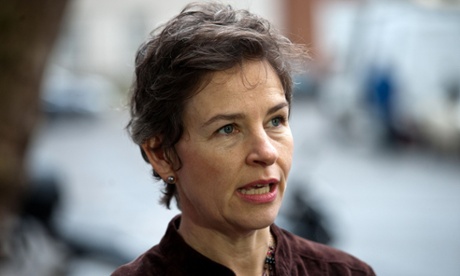
The UK should have fruit trees blossoming around housing estates, schools with access to vegetable gardens and council allotments for growing fresh vegetables, Labour said on Wednesday while setting out its strategy for the future of food policy. The vision of ways to bring food-growing to the masses was accompanied by measures on reforming food-safety regulations and supporting more jobs in farming.
Mary Creagh, shadow environment secretary, recalled the measures taken by the post-war Labour government of Clement Attlee to green the new housing that was required all over the country, with an eye to wartime shortages, by planting fruit trees – cherries mainly in the north, apples more prevalent in the south - that provided a free source of much-needed fresh fruit in a time of austerity. She said councils should think "creatively" about social housing and other developments, to promote the growing of local food, as the UK was suffering from a "nutrition recession" that was being ignored by the coalition.
She said ensuring high-quality food for schools and hospitals must be one of the highest priorities: "We know how much of a difference this makes, so we should be taking steps to do something about it."
Creagh stopped short of advocating an allotment or vegetable garden for every school, because some inner city schools may need their scarce land for sports and play, but said that housing associations should be planting orchards rather than merely decorative trees such as larches and planes. Recent studies have suggested that the amount of fresh fruit and vegetables eaten by lower income families has plummeted during the recession, because of its high cost relative to mass-produced meals and fast food, and experts are worried about the effects on children and the obesity epidemic.
Labour also wants reform of food safety rules, by giving the Food Standards Authority new powers to order inspections into suppliers, aimed at preventing a repeat of the horsemeat scandal. Under the proposals, the FSA would be able to compel supermarkets to test their products and to reveal the results publicly, which is not the case at present.
The policy statement would also require the reunification of the FSA's powers, some of which have been taken over by the Department of Food and Rural Affairs and its agencies.
Creagh said that the £2bn a year used to buy food for the public sector – including schools, hospitals and local and central government – should be redirected towards purchasing high-quality local food from the UK, which she said could be done at equal cost to current procurement methods. EU rules forbid member states from privileging their own suppliers above EU imports. But by specifying certain qualities – for instance, meat and dairy products from "cruelty-free" farms, or enforcing "UK welfare standards" on all products – the government could ensure that more of its procurement comes from the UK, which would help reduce the £19bn of food that is imported every year.
Under the last Labour government, the amount of food procured by public bodies from the UK and from sources abroad was tracked, but this work was halted under the coalition so it is now impossible to tell where food for public services has come from, according to Huw Irranca Davies, shadow minister for food and farming.
"We need a comprehensive food strategy that addresses all of these issues," she said. "The era of cheap food is over, and food has to be a major priority."
She said that while the quality of many school dinners had improved in recent years, much more should be done to ensure children have access to better nutrition, at a low cost.
With the coalition pushing for the development of genetically modified plants, Creagh was more cautious, saying that while the Labour party supported biotechnology research, there were also many ways to improve crop productivity under more traditional methods of plant breeding.
Creagh also plans a further report this autumn into food waste and food supply, aimed at stanching the estimated one-third of uneaten food that ends up in British dustbins every year.

